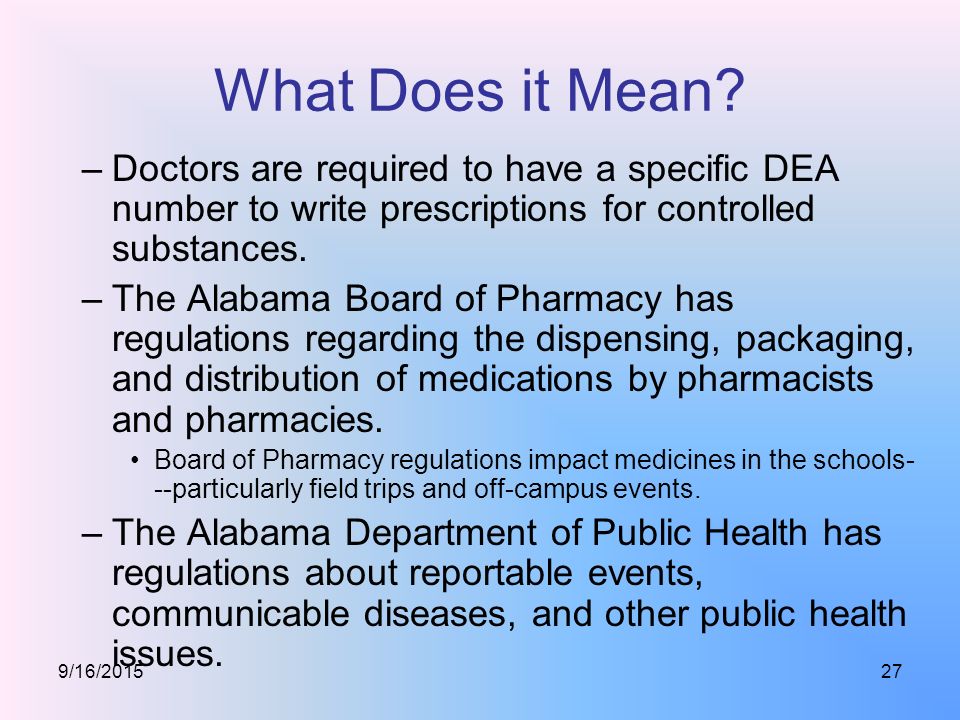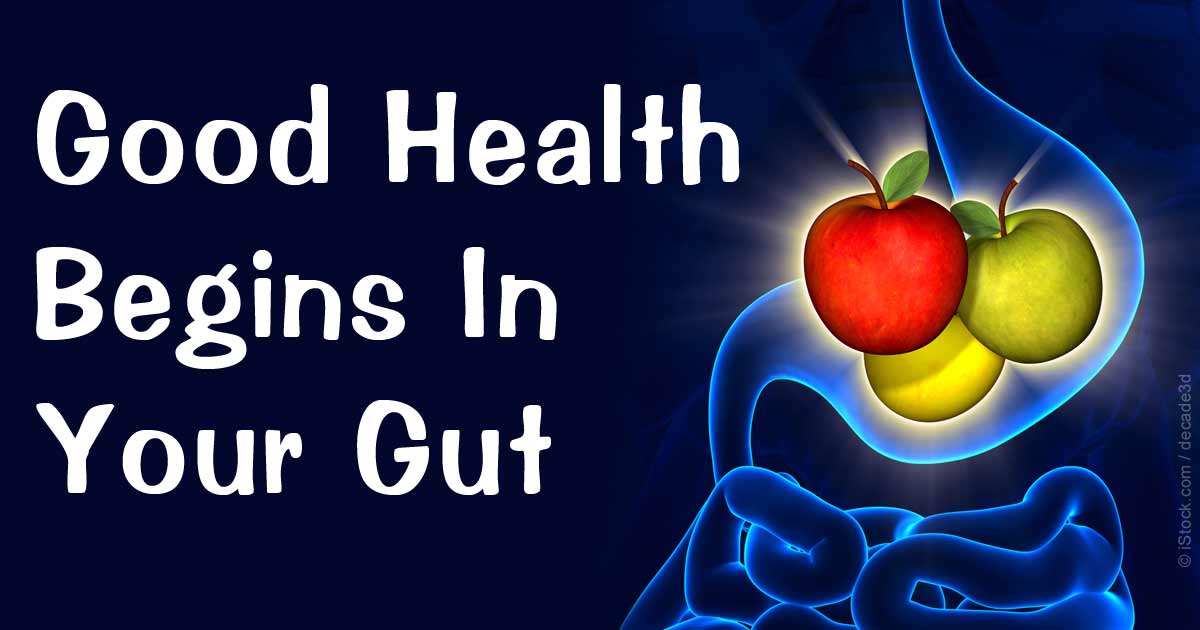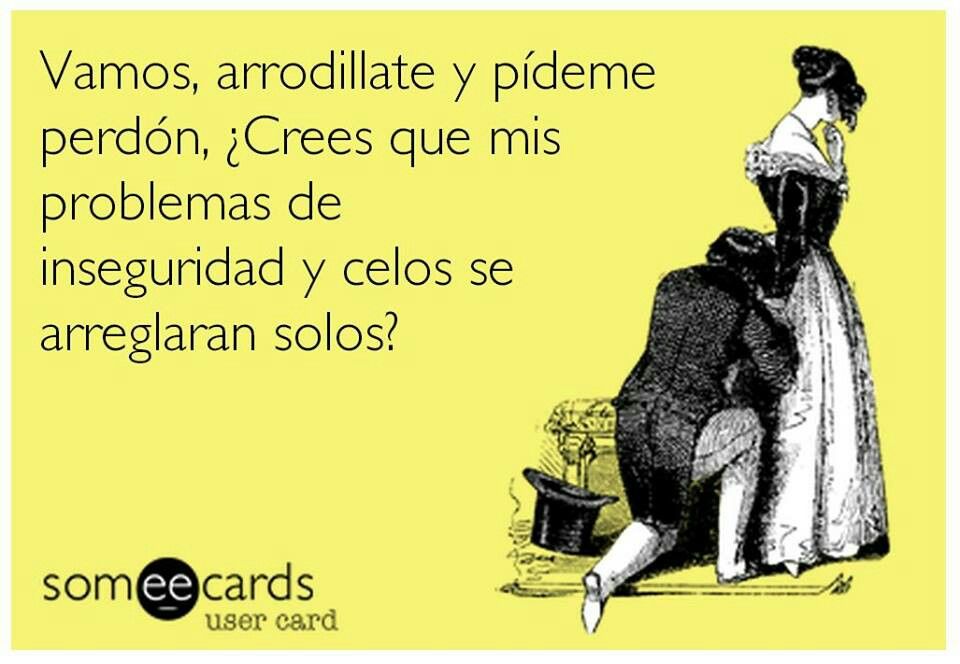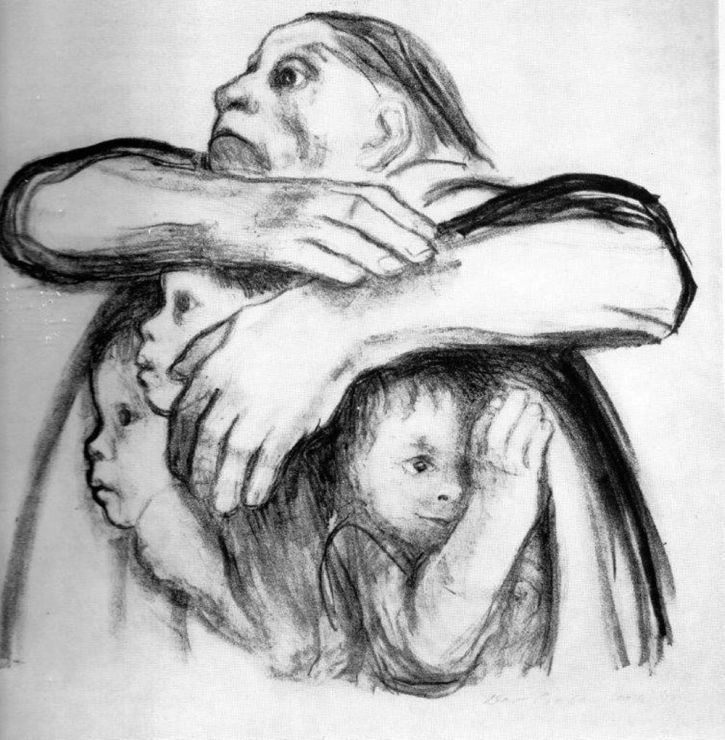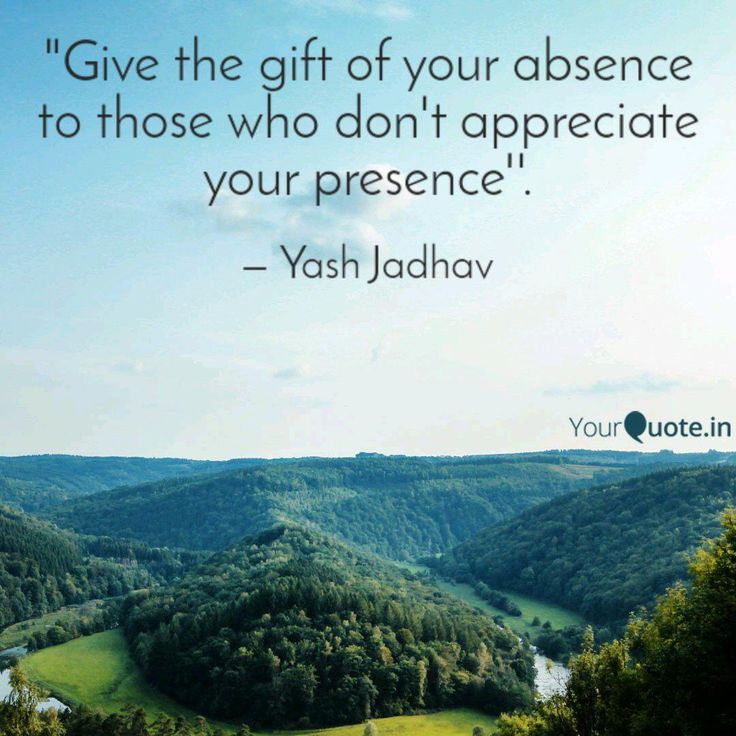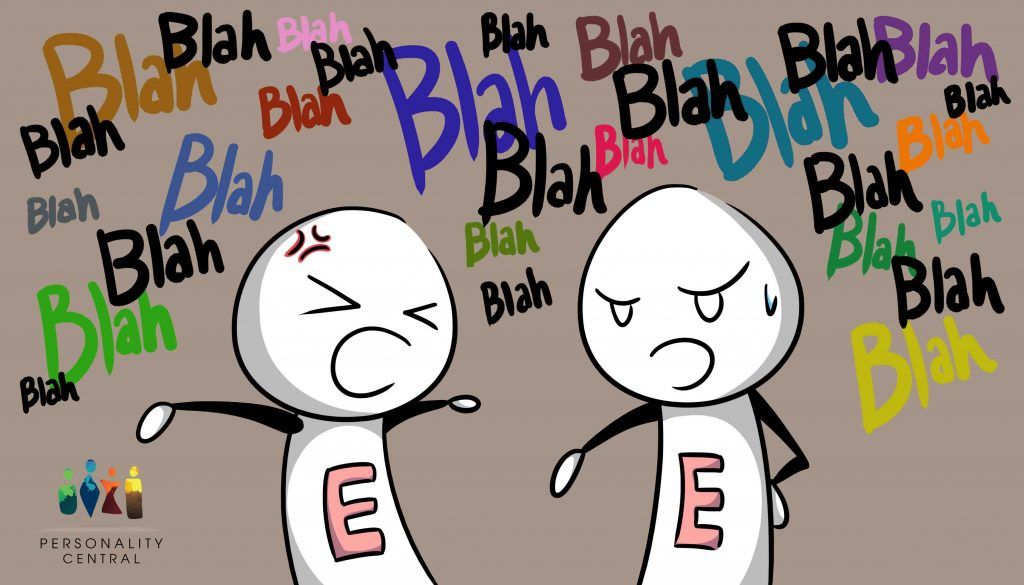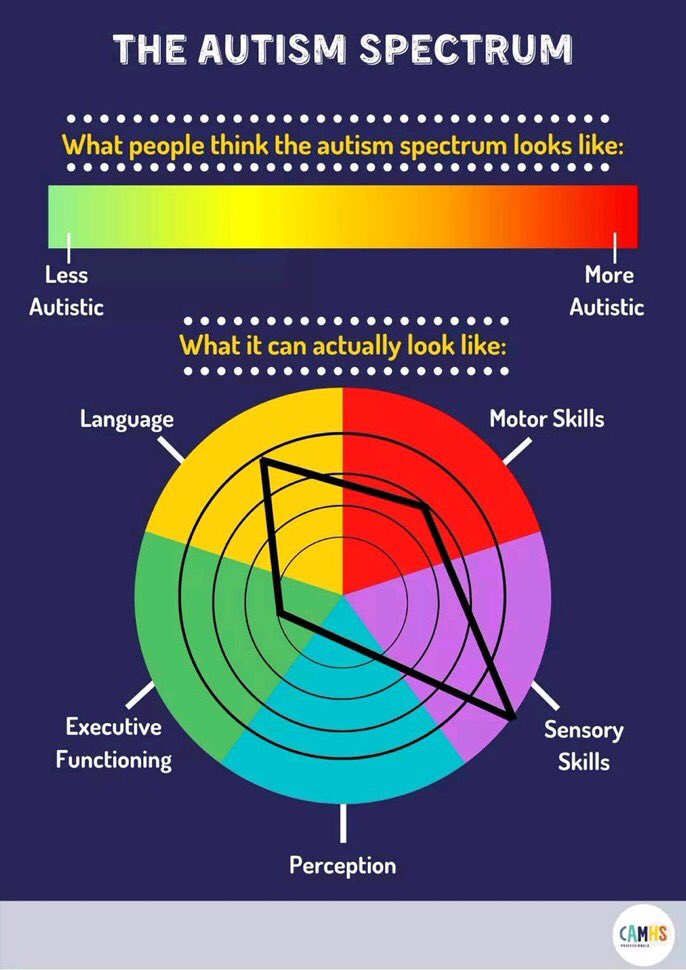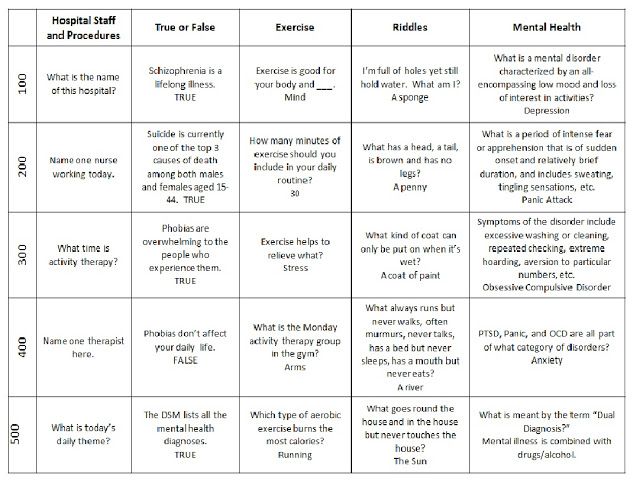Codependent romantic relationships
Symptoms, warning signs, and behavior
The term ‘codependency’ is often used casually to describe relationships where a person is needy, or dependent upon, another person.
There is much more to this term than everyday clinginess. Codependent relationships are far more extreme than this. A person who is codependent will plan their entire life around pleasing the other person, or the enabler.
In its simplest terms, a codependent relationship is when one partner needs the other partner, who in turn, needs to be needed. This circular relationship is the basis of what experts refer to when they describe the “cycle” of codependency.
The codependent’s self-esteem and self-worth will come only from sacrificing themselves for their partner, who is only too glad to receive their sacrifices.
Fast facts on codependency:
- Codependent relationships can be between friends, romantic partners, or family members.
- Often, the relationship includes emotional or physical abuse.
- Friends and family members of a codependent person may recognize that something is wrong.
- Like any mental or emotional health issue, treatment requires time and effort, as well as the help of a clinician.
It is important to know the difference between depending on another person — which can be a positive and desirable trait — and codependency, which is harmful.
The following are some examples that illustrate the difference:
Dependent: Two people rely on each other for support and love. Both find value in the relationship.
Codependent: The codependent person feels worthless unless they are needed by — and making drastic sacrifices for — the enabler. The enabler gets satisfaction from getting their every need met by the other person.
The codependent is only happy when making extreme sacrifices for their partner. They feel they must be needed by this other person to have any purpose.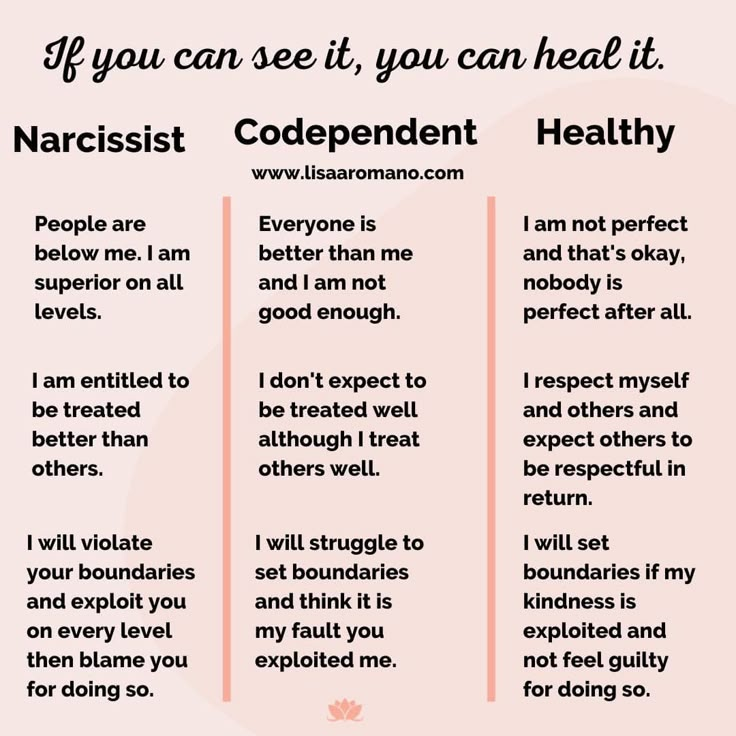
Dependent: Both parties make their relationship a priority, but can find joy in outside interests, other friends, and hobbies.
Codependent: The codependent has no personal identity, interests, or values outside of their codependent relationship.
Dependent: Both people can express their emotions and needs and find ways to make the relationship beneficial for both of them.
Codependent: One person feels that their desires and needs are unimportant and will not express them. They may have difficulty recognizing their own feelings or needs at all.
One or both parties can be codependent. A codependent person will neglect other important areas of their life to please their partner. Their extreme dedication to this one person may cause damage to:
- other relationships
- their career
- their everyday responsibilities
The enabler’s role is also dysfunctional. A person who relies upon a codependent does not learn how to have an equal, two-sided relationship and often comes to rely upon another person’s sacrifices and neediness.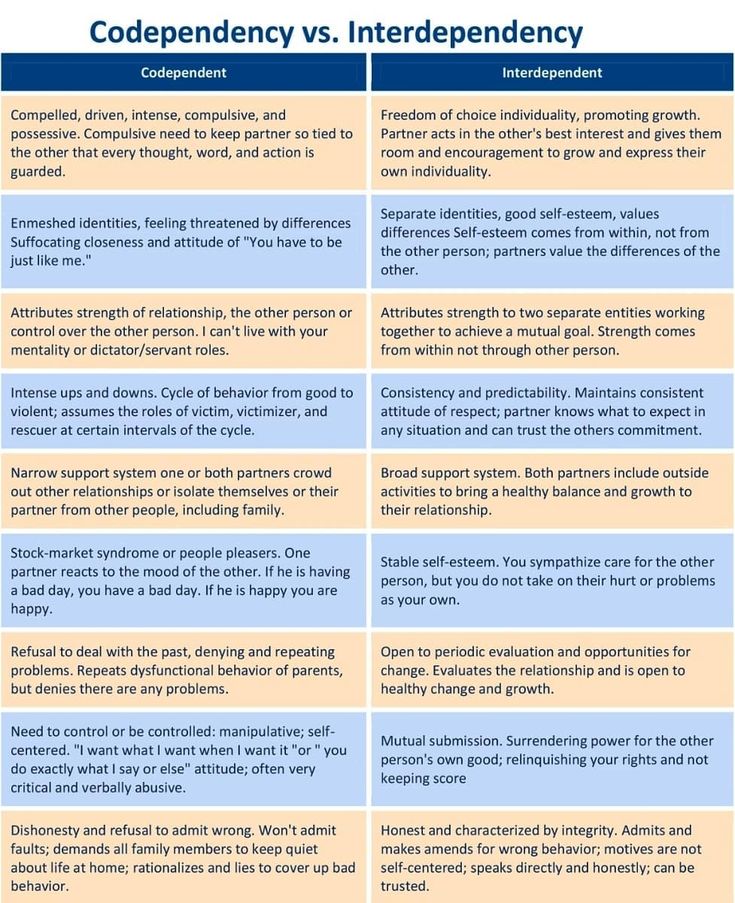
It can be hard to distinguish between a person who is codependent and one who is just clingy or very enamored with another person. But, a person who is codependent will usually:
- Find no satisfaction or happiness in life outside of doing things for the other person.
- Stay in the relationship even if they are aware that their partner does hurtful things.
- Do anything to please and satisfy their enabler no matter what the expense to themselves.
- Feel constant anxiety about their relationship due to their desire to always be making the other person happy.
- Use all their time and energy to give their partner everything they ask for.
- Feel guilty about thinking of themselves in the relationship and will not express any personal needs or desires.
- Ignore their own morals or conscience to do what the other person wants.
Other people may try to talk to the codependent about their concerns. But even if others suggest that the person is too dependent, a person in a codependent relationship will find it difficult to leave the relationship.
The codependent person will feel extreme conflict about separating themselves from the enabler because their own identity is centered upon sacrificing themselves for the other person.
Codependency is a learned behavior that usually stems from past behavioral patterns and emotional difficulties. It was once thought to be a result of living with an alcoholic parent.
Experts now say codependency can result from a range of situations.
Damaging parental relationships
Share on PinterestAlcohol, drugs, or other addictions are common factors that may lead parents to prioritise their needs over their children’s. This may cause the children to become codependent as adults.
People who are codependent as adults often had problems with their parental relationship as a child or teenager.
They may have been taught that their own needs were less important than their parents’ needs, or not important at all.
In these types of families, the child may be taught to focus on the parent’s needs and to never think of themselves.
Needy parents may teach their children that children are selfish or greedy if they want anything for themselves.
As a result, the child learns to ignore their own needs and thinks only of what they can do for others at all times.
In these situations, one of the parents may have:
- an addiction problem with alcohol or drugs
- a lack of maturity and emotional development, resulting in their own self-centered needs
These situations cause gaps in emotional development in the child, leading them to seek out codependent relationships later.
Living with a mentally or physically ill family member
Codependency may also result from caring for a person who is chronically ill. Being in the role of caregiver, especially at a young age, may result in the young person neglecting their own needs and developing a habit of only helping others.
A person’s self-worth may form around being needed by another person and receiving nothing in return.
Many people who live with an ill family member do not develop codependency. But, it can happen in these types of family environments, particularly if the parent or primary caretaker in the family displays the dysfunctional behaviors listed above.
Abusive families
Physical, emotional, and sexual abuse can cause psychological problems that last years or even an entire lifetime. One of the many issues that can arise from past abuse is codependency.
A child or teenager who is abused will learn to repress their feelings as a defense mechanism against the pain of abuse. As an adult, this learned behavior results in caring only about another’s feelings and not acknowledging their own needs.
Sometimes a person who is abused will seek out abusive relationships later because they are only familiar with this type of relationship. This often manifests in codependent relationships.
Share on PinterestIndividual or group therapy may be more beneficial than couples therapy, since it encourages the person to explore their feelings and behaviours as an individual outside of the relationship.
A few things can help toward forming a positive, balanced relationship:
- People in codependent relationships may need to take small steps toward some separation in the relationship. They may need to find a hobby or activity they enjoy outside of the relationship.
- A codependent person should try to spend time with supportive family members or friends.
- The enabler must decide that they are not helping their codependent partner by allowing them to make extreme sacrifices.
Individual or group therapy is very helpful for people who are in codependent relationships. An expert can help them find ways to acknowledge and express their feelings that may have been buried since childhood.
People who were abused will need to recognize past abuse and start to feel their own needs and emotions again.
Finally, both parties in a codependent relationship must learn to acknowledge specific patterns of behavior, such as “needing to be needed” and expecting the other person to center their life around them.
These steps are not easy to do but are well worth the effort to help both parties discover how to be in a balanced, two-sided relationship.
20 Signs Of A Codependent Relationship, From A Psychologist
What is codependency?
The simple definition of codependency is when you are dependent on another for your sense of worth, and you use various forms of manipulation to attempt to get their love and approval in order to feel worthy.
"Manipulation" might seem like a harsh word that you don't relate to, but manipulating others isn't always conniving and cruel-intentioned. For example, you might try to make yourself responsible for your partner's feelings and tell yourself you're doing it because you care about them—when in reality it's a form of control to get their love and approval. Or conversely, you might be directly demanding as your form of control to get your partner to fill the empty hole within you.
Advertisement
This ad is displayed using third party content and we do not control its accessibility features.
What is a codependent relationship?
A codependent relationship occurs when each partner abdicates responsibility for themselves. Generally, one partner is the "taker" while the other is the "caretaker," although these roles can switch depending on the issue. For example, one partner might be a caretaker financially and a taker emotionally or sexually. (Codependent relationships aren't always romantic, though: there can also be codependent friendships and similarly enmeshed family dynamics.)
This relationship might seem to work for a while, until either the caretaker feels angry, hurt, and drained from never getting the love and approval they are seeking, or the taker, never feeling filled up enough, seeks attention elsewhere.
Symptoms of codependency.
Taker symptoms:
- Feeling heavily reliant on others to be content
- Feeling needy of others' attention and approval
- Feeling empty and unfulfilled
- May feel irritated or angry often
- May feel entitled to the other person's time and energy
- Comparing self to others
Advertisement
This ad is displayed using third party content and we do not control its accessibility features.
Caretaker symptoms:
- Needing to be needed to feel like you matter
- Having a hard time receiving
- Feeling like a martyr, sacrificing yourself
- Feeling constantly anxious about meeting others' needs
- Perfectionism
- Overly busy
- Rarely spending time on yourself
What causes codependency?
Codependency results from not being able to fully love yourself, independent of others' love, attention, or validation. Couples often become codependent because each person cannot recognize their own worth without feeling cared for and/or needed by the other. In other words, codependency is caused by an underlying sense of self-rejection and self-abandonment.
Advertisement
This ad is displayed using third party content and we do not control its accessibility features.
Signs you're in a codependent relationship:
1.
You pay more attention to your partner's feelings than your own.
This one applies to the caretaker, specifically: You are tuned in to your partner's feelings but tend to ignore your own feelings or often don't even know how you feel.
Advertisement
This ad is displayed using third party content and we do not control its accessibility features.
2.
You depend on your partner to feel okay.
You make your partner responsible for your feelings; that is, you make it so your unhappiness is tied to your partner's actions instead of taking responsibility yourself for how you feel. This one is more specific to the taker's experience in a codependent relationship, but actually, both partners likely feel dependent on their partner for their sense of self in some way.
3.
You don't feel at ease when you're together.
You feel stressed around your partner, and you often feel irritated and frustrated with your partner. You are more relaxed around others than around your partner.
4.
You'd do anything for your partner's approval.
You may often judge yourself harshly, which might manifest as you pushing yourself to look good and perform right in order to get the attention and approval from your partner.
5.
You don't feel good in the relationship.
You're not feeling turned on to your partner. You don't have fun together, and there isn't much affection. You feel lonely with your partner, and you also feel alone—that your partner doesn't have your back.
6.
There's a lot of tension in the relationship.
You have frequent fights, and you blame each other, believing if only the other would change, everything would be OK.
7.
The relationship feels stagnant.
You feel stagnant and stuck in the relationship. You don't know how to bring life back into the relationship. You feel that you are settling, and that perhaps you are with the wrong partner.
How to stop being codependent.
If you find yourself in a codependent relationship, it's important to acknowledge what's happening and work to create a relationship where each person can stand on their own two feet.
Learning to love yourself and define your own worth can work wonders in your relationship, and it's the first step in the process of how to stop being codependent. For example, if you feel alone and empty, instead of blaming your partner, go inside to see how you are treating yourself. You have no control over your partner changing, but you have total control over you changing.
For example, if you feel alone and empty, instead of blaming your partner, go inside to see how you are treating yourself. You have no control over your partner changing, but you have total control over you changing.
It might be challenging to stop trying to get love from others, but when you instead learn to see, value, and love yourself, that's when you have love to share with your partner. There is a huge difference between trying to get love versus wanting to share love. When you want to get love, you are coming from an empty place of self-abandonment, and when you want to share love, you are feeling full of love from loving yourself, and the love spills over to your partner.
Even if just one of you decides to learn to love yourself rather than continue to reject and abandon yourself, you can change your codependent relationship to a loving, interdependent relationship. When one person changes the codependent system, the whole system changes.
Co-Dependency Relationships: What They Are, Signs and Causes, How to Get Out of Them
Co-dependency in a relationship can be incredibly destructive, in part because you may not even be aware that it is present in your life. Clinical psychologist and co-founder of the YouTalk online service Anna Krymskaya explains what co-dependent relationships are, what are their causes, how to recognize and overcome them
Clinical psychologist and co-founder of the YouTalk online service Anna Krymskaya explains what co-dependent relationships are, what are their causes, how to recognize and overcome them
What is co-dependent relationships
There is no single definition of "co-dependency" in the psychological community. On the one hand, this term describes the violation of personal boundaries between partners, when two people in a relationship are emotionally or financially dependent on each other, and the main need of one is to “bind” the other, to become part of it. On the other hand, in psychology, "codependency" is also called a dysfunctional relationship with a partner suffering from some kind of pathological addiction - alcoholism, drug addiction, gambling, and so on.
This article will focus on the first phenomenon, that is, codependence in a couple, which is accompanied by excessive absorption in another person, painful experiences - and is reflected in all areas of life.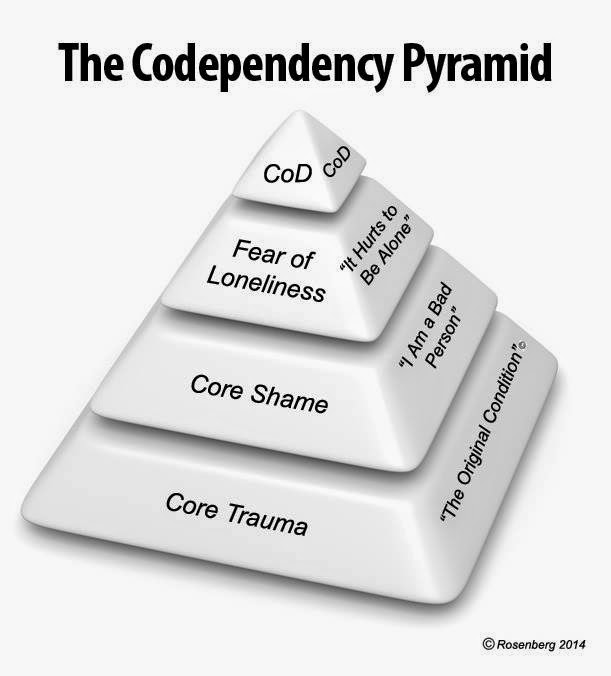
Immediately spoiler - if you are co-dependent, this does not mean that only parting can solve this problem. Every situation is different. Having received help and feedback from a specialist, it is possible to maintain relationships and direct them into a functionally healthy direction.
Related material
Drama Triangle
More than 40 years ago, the American psychiatrist Stephen Karpman introduced the “triangle of fate”, or “dramatic triangle”, a psychological and social model of interaction between people, consisting of three facets-roles: “persecutor” (English persecutor) , "rescuer" (English rescuer) and "victim" (English victim). The Karpman Triangle reflects the structure of co-dependent relationships.
The “pursuer” sets his own rules, controls, imposes his point of view, does not allow mistakes and is constantly looking for the guilty.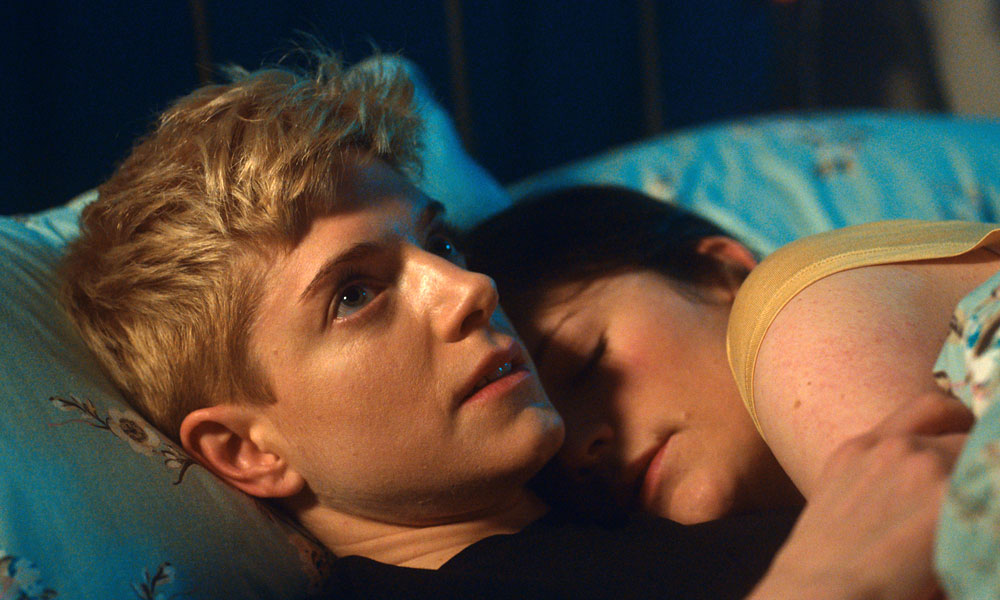 When he cannot clearly show his anger, he blackmails and manipulates. The “victim” ignores his own needs, dissolves into the “persecutor” with whom, as it seems to her, she is connected with true love, and the thought of losing her introduces the “victim” into a panic. The "rescuer" feels his value through the imposition of help and a sense of superiority over the "victim". In co-dependent relationships, each of the participants at some point tries on one of the three roles, but cannot get out of the vicious circle, because he is afraid and denies the destructiveness of the situation.
When he cannot clearly show his anger, he blackmails and manipulates. The “victim” ignores his own needs, dissolves into the “persecutor” with whom, as it seems to her, she is connected with true love, and the thought of losing her introduces the “victim” into a panic. The "rescuer" feels his value through the imposition of help and a sense of superiority over the "victim". In co-dependent relationships, each of the participants at some point tries on one of the three roles, but cannot get out of the vicious circle, because he is afraid and denies the destructiveness of the situation.
How to distinguish codependent relationships from healthy ones
We all depend on each other to some extent. Mutual support, emotional connection, dialogue, mood attunement, shared interests are all important factors in a healthy relationship. Codependent relationships are a toxic bond without which people cannot function. They lose their autonomy. Any difficulties in relationships with a partner are reflected in other areas of life, including interactions with loved ones, friends and colleagues. At the deep stages of codependence, a person can move away, avoid communication with the outside world, because talking about their relationship is scary, embarrassing and uncomfortable, any advice or hint of an unhealthy relationship is perceived with aggression and distrust.
Any difficulties in relationships with a partner are reflected in other areas of life, including interactions with loved ones, friends and colleagues. At the deep stages of codependence, a person can move away, avoid communication with the outside world, because talking about their relationship is scary, embarrassing and uncomfortable, any advice or hint of an unhealthy relationship is perceived with aggression and distrust.
If communication with a child was built through submission and disregard for his desires and he sought to please in order to earn the encouragement and “love” of his parents, as an adult, he will be more inclined to enter into codependence
the most important thing in life, the existentially important. An independent person may have a career in second place, a hobby in third, and travel in fourth. A codependent, on the other hand, will not be able to easily pass a value test by setting priorities from 1 to 10: all other areas of life pale against the backdrop of the significance of relationships with a partner, without them life is empty and meaningless.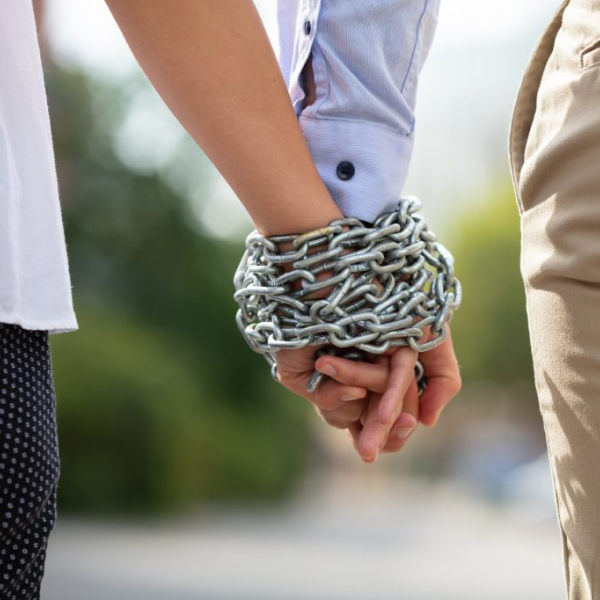
Causes of co-dependent relationships between a man and a woman
The tendency to co-dependent behavior is often formed in childhood. The reasons are related to the peculiarities of relationships in the parental family and how a close adult reacted to the needs of the child: was he sensitive to successes and peculiarities, was he emotionally available, did he give freedom of action, or, conversely, overprotected when the child could already do something do it himself and his life did not directly depend on the parent. It is noteworthy that any of the extremes can contribute to the formation of codependency in the future.
For a child, on a biological level, the absence of the love of a mother or other close relative who fulfills her role means death. Love in the family means that the child will be safe, he will not be abandoned, he will survive and his emotional needs will be met. Research shows that emotional abuse and neglect in childhood puts us at risk of developing codependent behavior in the future.
Related material
If communication with a child was built through submission and neglect of his desires and he sought to please in order to earn the encouragement and "love" of his parents, as an adult, he will be more inclined to enter into codependency in marriage, in a relationship with a romantic partner. This behavior is also called the "home instinct" - that is, the reproduction of the situation of childhood in their current relationship. This happens on an unconscious level.
For example, if a girl grew up without a father or he was an emotionally unavailable figure as an adult, she may look for a man who will show similar emotional stinginess: not revealing the details of his life to the end, being as if in a distance, avoiding frank conversations. At the same time, the girl may be aware of the similarities with the relationship of her parents, but she will be firmly convinced that now, in her personal life, she will be able to change everything and correct mistakes. For example, if her parents divorced, then she definitely will not allow this and her children will not be left without a father. However, the "home instinct" often leads not only to the repetition of patterns of behavior, but also leads to the same result.
For example, if her parents divorced, then she definitely will not allow this and her children will not be left without a father. However, the "home instinct" often leads not only to the repetition of patterns of behavior, but also leads to the same result.
Co-dependent people believe that if they behave correctly, find the right words, do something differently, they will magically earn the love of a partner
How to understand that you are in a co-dependent relationship
Co-dependence manifests itself in different ways. It is always necessary to evaluate the intensity and coincidence of several signs of a co-dependent relationship, among which: Show control behavior, impose your will. You expect your partner to behave in a certain and understandable way for you.
- Rapid rapprochement
You met and can't part, move in quickly, get married quickly. Often in this case, the idealization of the partner is inflated to the maximum. Our consciousness turns expectations and fantasies about the qualities of a partner into reality.
Often in this case, the idealization of the partner is inflated to the maximum. Our consciousness turns expectations and fantasies about the qualities of a partner into reality.
- Search for salvation
In another person you see salvation from your loneliness and inner emptiness. Career, hobbies, interests, life guidelines and principles - nothing but your partner can fill the void inside, only with him or her you feel "at home".
- No choice
You cannot recognize and respect your partner's right to make your own choices. The fact that his or her desires and decisions may differ from yours is frightening and not discussed.
- Impaired sensitivity to self and others
You are aware of only fragmentary knowledge about yourself and your partner, reproducing repetitions of your emotions and behavior from year to year. It's like living the same scenario. The dominant feelings and behavioral reactions in this scenario will be guilt, anger, fear, distrust, overprotection, overcontrol.
- Difficulty in taking responsibility
Responsibility for your well-being, development, satisfaction of needs lies with the partner. You are guided by the phrase "I would, ... but ..." and as if living a draft of your life.
- The idea that your partner owes you
Co-dependent relationships are hard to negotiate. Attitudes regarding the behavior and responsibilities of a partner (for example, that a woman should be a muse, and a man should be a breadwinner) do not change from the beginning of a relationship and do not allow discussion.
- Low self-esteem
There is no inner conviction that you are worthy and valuable in yourself. You have constant doubts, and by your behavior you are trying to earn love, praise and prove that you have a right to it.
Related material
- Money problems
Being financially dependent on a partner makes us feel small and in need of care. This desire can again be associated with the “instinct at home”, because children do not have to and cannot provide for themselves. Fanatical accumulation may indicate the opposite - the fear of losing independence and asking for help. In a healthy relationship, flexibility is implied, where financial roles can be changed without juggling the roles of "rescuer", "victim" and "persecutor".
- Revenge and competition
If your partner made a mistake and did something unpleasant, instead of giving constructive feedback and discussing the issue, you harbor resentment.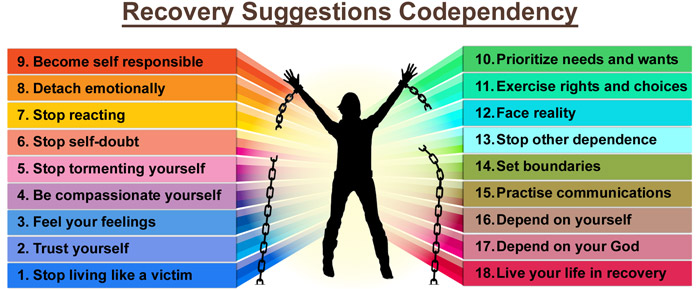 At the right moment, you repeat the behavior of your partner in order to hurt him or her and say with grim satisfaction "why you can behave like this, but I can't."
At the right moment, you repeat the behavior of your partner in order to hurt him or her and say with grim satisfaction "why you can behave like this, but I can't."
- Magical thinking
Codependent people believe that if they behave correctly, find the right words, do something different, they will magically earn the love of a partner. As in childhood: if I get an A or clean the house, my parents will praise and love me more.
In addition, codependent people often have behavioral addictions such as workaholism, compulsive overeating, hoarding, or an obsessive need for perfect cleanliness and organization of space. The life of a codependent is similar to chaos, these habits help to ground and calm down in eternal anxiety, to create a feeling of control over one's life.
Consequences of co-dependent relationships
In co-dependent relationships, a person seems to lose himself, personal boundaries are erased, hobbies disappear and attention to his needs disappears.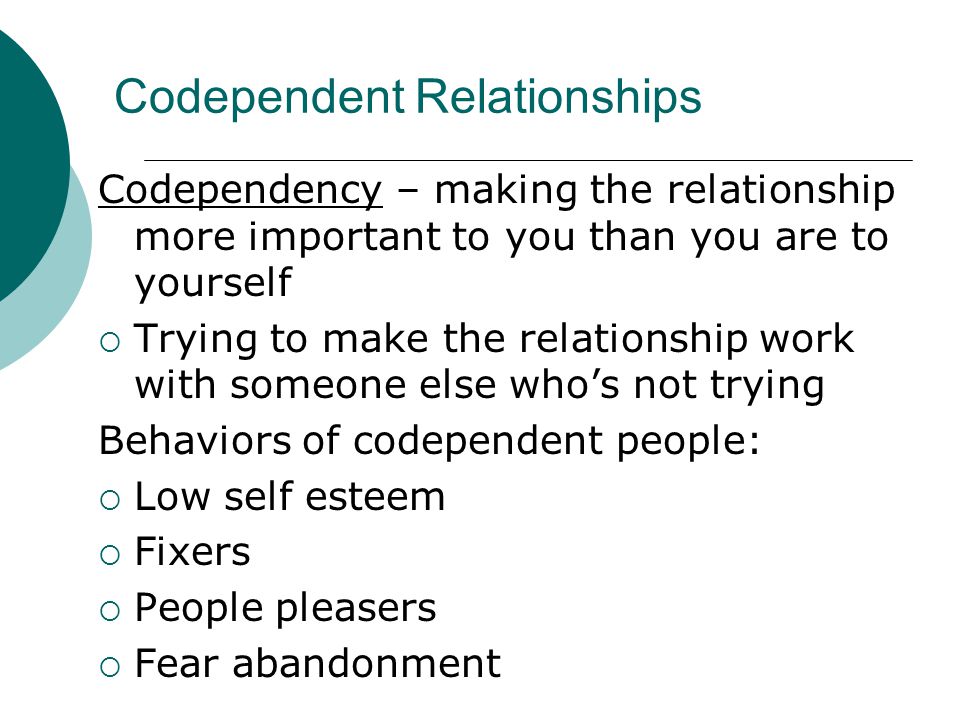 At the same time, all resources are spent on maintaining toxic relationships, and not on trying to restore the psychological state.
At the same time, all resources are spent on maintaining toxic relationships, and not on trying to restore the psychological state.
Very often codependence characterizes cyclicity. A person experiences an emotional swing - happiness and a temporary idyll are replaced by aggression, manipulation, neglect. Moreover, such changes occur suddenly, so one of the partners is constantly in suspense, waiting at any moment for a change in the weather. It shatters the psyche and self-esteem.
Breaking up a relationship is not always the only way out. If desired, partners can change their relationship if they make this decision together and make an effort
The companion of co-dependent relationships is violence. It can be physical - blows, spanks, pushes, even hugs against the will; sexual - uncomfortable touching or sexual contact against the will and consent; emotional - insults and verbal injections, various manipulations of feelings. In families with a codependency problem, passive violence can also be observed in relation to children, when parents are emotionally unavailable: there is no swearing, but there are no warm words or physical contact. Also, the responsibilities of an adult may not be transferred to the child in a timely manner - for example, the elder is expected to constantly care for the younger ones.
In families with a codependency problem, passive violence can also be observed in relation to children, when parents are emotionally unavailable: there is no swearing, but there are no warm words or physical contact. Also, the responsibilities of an adult may not be transferred to the child in a timely manner - for example, the elder is expected to constantly care for the younger ones.
Violence is terrible both in itself and in its consequences. Children often develop attachment trauma that will prevent them from building trusting relationships in the future. If a person managed to get out of a co-dependent relationship, but failed to undergo personal therapy or it was insufficient, the risk of a vicious circle and a repetition of the experience with another partner is high.
How to get out of a codependent relationship
People who are prone to codependence are afraid of parting. This is a painful process, often a couple exhausted by toxic relationships does not have enough resources and energy for it. But breaking up is not always the only way out. If desired, partners can change their relationship if they make this decision together and put effort into it.
But breaking up is not always the only way out. If desired, partners can change their relationship if they make this decision together and put effort into it.
Related material
Each situation is different, so it is not possible to give a short universal scheme. But here are some strategies and exercises to get you started:
- Self-diagnosis. Ask yourself these questions: Why am I not happy with the relationship? What are my needs being ignored? What is the value of this relationship for me? Do our views coincide with the partner regarding the development of our relations? Do I have unrealistic ideas about the future of our relationship? Am I ready to be with my partner if he/she doesn't stop meeting my expectations? What exactly do I want to change? What efforts am I willing to make for this?
- Work through childhood trauma and relationships with parents.
 Find out what processes you transfer to communication with a partner. It is best to do this with the support of a psychologist.
Find out what processes you transfer to communication with a partner. It is best to do this with the support of a psychologist.
- Shift the focus from your partner's desire to your desires. Ask yourself what exactly you want.
- Make a list of things you have in common and that are different with your partner. Try to learn to respect and accept your differences.
- Keep a diary of feelings. Keep track of what emotions cause you certain situations in communication with a partner.
- Focus on yourself, your interests and relationships with friends and loved ones. Find a new hobby, travel, or study.
- Work with the fear of being alone. Again, it is better to do this with a psychologist.
- Make a list of grievances against your partner, analyze them and try to identify what you are grateful for, what lessons you learned from them.

- Talk to your partner about couples or family therapy.
If you want to start the path out of co-dependency on your own, turn to self-help literature - for example, read the books of the book "Free from Addiction" by Berry and Janey Weinhold, "Codependency Through the Eyes of a Systemic Therapist" by Natalia Manukhina, "Hold Me Tight. 7 Dialogues for the Love of a Lifetime Susan Johnson, Borrowed Life by Irina Mlodik.
Get ready that the process of getting out of a co-dependent relationship is not quick and not easy. Don't neglect help. In addition to psychotherapy, you can seek support in special free groups. CoDa (“Codependents Anonymous”) is an international community that organizes meetings, including online in Russian. Nar-Anon and Al-Anon help those whose co-dependent relationships involve the drug and alcohol addiction of one of the partners.
Sick love: how to get out of codependent relationships
As children, we loved fairy tales about beautiful princesses and did not think that these stories are excellent illustrations of psychological disorders. For example, Cinderella, who devoted her whole life to serving the evil sisters, and then her suffering was rewarded - she met a handsome prince. Or Belle, forced to live in a palace with a monster for the safety of her father and pity for the bewitched prince. One way or another, all these stories are a demonstration of unhealthy relationships in which there is no place for trust and mutual respect, and it is they who still live in the minds of many, already adults, people. Together with psychologist and Gestalt therapist Maria Brazgovskaya, we figure out how to recognize love addiction and what to do about it.
For example, Cinderella, who devoted her whole life to serving the evil sisters, and then her suffering was rewarded - she met a handsome prince. Or Belle, forced to live in a palace with a monster for the safety of her father and pity for the bewitched prince. One way or another, all these stories are a demonstration of unhealthy relationships in which there is no place for trust and mutual respect, and it is they who still live in the minds of many, already adults, people. Together with psychologist and Gestalt therapist Maria Brazgovskaya, we figure out how to recognize love addiction and what to do about it.
Everything that is so romantic in fairy tales, in life often turns into a plot of co-dependent relationships. In such a relationship, one partner is unnecessarily fixed on the second - he cannot live without constant contact with him or, on the contrary, believes that his couple is not able to live without his guardianship and attention.
Unloved children or children who grew up in hypercontrol often compensate for the lack of love by desperately looking for a partner, and then by their painful attachment to him. Victims of parental aggression find it normal to be abused by a partner. Typical childhood traumas are insecurity, difficulty setting boundaries, anxiety, difficulty understanding one's desires, and weak will. Childhood ends, but the pain remains.
Victims of parental aggression find it normal to be abused by a partner. Typical childhood traumas are insecurity, difficulty setting boundaries, anxiety, difficulty understanding one's desires, and weak will. Childhood ends, but the pain remains.
It works like this. Normal relationships move from proximity to distance and back again. With this movement, there is no feeling of "I was abandoned" or "I'm about to be left." You woke up in the morning, talked and went to work. You are in contact with each other, but do not grab your head if the other is busy. In the evening he has a training session, and so do you. We met at home before going to bed. That is, you feel good together, but you can do without each other. Your partner is not a constant focus of your attention.
In co-dependent relationships, people do not let each other go far, they are constantly overcome by a feeling of anxiety and fear. Love for them is always painted with pain. This is a special way of thinking, at the root of which lies fear - the fear of being alone, the fear of being abandoned, unchosen, the fear of living one's own life, in the end.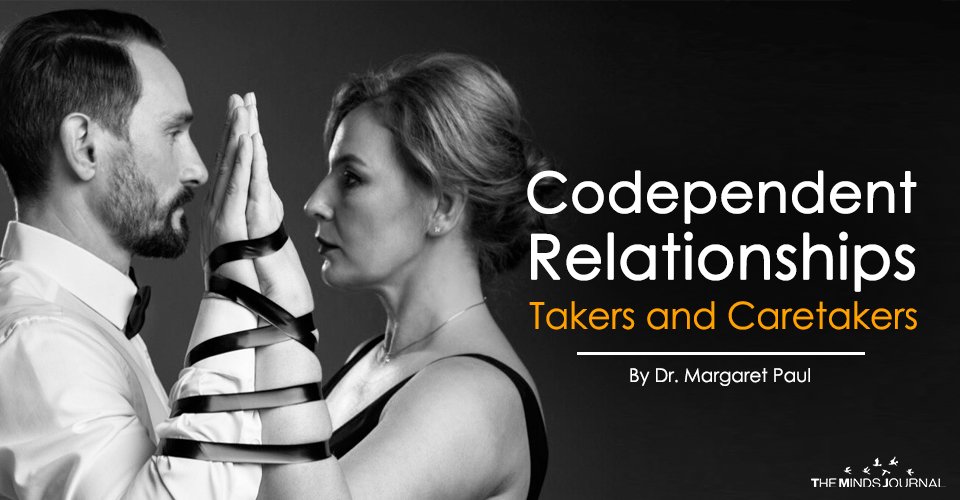
In addition, this type of thinking is characterized by a fabric of illusions, a need for drama and deafness to one's own feelings.
There are typical motion vectors of such love-suffering:
- Being a victim
- being a savior
In both cases, the woman believes that by the power of her love and her actions she will change the other. She believes in her strange omnipotence, and she knows no limit to her love (patience).
The trick is that in a co-dependent relationship, the partners match in their behavior patterns, like pieces of a puzzle. One suffers, the other repels, one saves, the second drinks, one child, the second a nanny, one mistress, the second husband who never leaves his wife.
If a woman chooses the pattern of a victim of her own love, then the partnership promises her a better life. Even a dull and hopeless relationship seems to her a better lot than to be left alone.
Often in such relationships there is an idealization of the partner - only in his eyes does she feel unique, important and worthy of attention. Or there is a devaluation of her own capabilities - a woman believes that she will not be able to reach career heights alone, she will not be able to find new relationships, and in any case she will fail.
Or there is a devaluation of her own capabilities - a woman believes that she will not be able to reach career heights alone, she will not be able to find new relationships, and in any case she will fail.
If a woman chooses the role of a savior, she unconsciously seeks confirmation of her own superiority. Perhaps she pays tribute to childhood trauma: she didn’t save her alcoholic dad, I’ll save her husband. However, this won't work. Firstly, because often the partner does not really want to be saved at all. Secondly, a woman herself does not believe that a strong man who is not sick with anything, does not disappear anywhere, is not bogged down in debts and loans, and does not lose money, can be needed.
Both do not know what true intimacy and affection are. They confuse sex with love, scenes of jealousy with the fear of losing a loved one, physical violence with a harmless manifestation of discontent. They cling to rare moments of contact, wanting to relive them over and over again, and ignore reality.
A woman dependent on a man will break his boundaries with her intrusive attention. Will yearn to be one with him. She can play on feelings of guilt, she can be mistaken herself, but over and over again choose the role of a helpless victim. She may not love her partner at all, but simply play the feeling out of fear of being left alone.
Manipulations can also be very aggressive: threats of suicide, demands to always report on leisure, spending, communication, manipulation of guilt. Behind such “manifestations of love” there is always a need for power. As well as behind the selfless desire to be the best in everything for a partner.
It is worth remembering that all this is not a need to love, but an attempt to fill a void in the soul. Co-dependent relationships help avoid a collision with reality - the need to heal childhood trauma on your own, to take responsibility for your life.
The co-dependent person sabotages any attempt at secession with all his might. This is why, deep down, wives of alcoholics often fear their recovery. Those who suffer in a love triangle agree on everything. Those who experience cold and neglect are ready to endure this too. Anything, just not the threat of parting.
This is why, deep down, wives of alcoholics often fear their recovery. Those who suffer in a love triangle agree on everything. Those who experience cold and neglect are ready to endure this too. Anything, just not the threat of parting.
If you find yourself in a codependent relationship, the first thing to do is give yourself time. It’s rare when you get to say “everything” to yourself and immediately get out of a co-dependent relationship, because you were brought into them by very deep downed internal settings. Change will take time and support, not self-blame. It's perfectly fine to plan ahead unless your safety is threatened (in which case it's worth packing up immediately). But your healing must be made the most important task - you must put yourself in the priority of your care and attention ( see also: How to stop patronizing others and start thinking about yourself?).
There are several important steps to a future without love addiction:
- It is important to learn to take responsibility and come to the understanding that no one owes anything to anyone, including parents and current partners.

